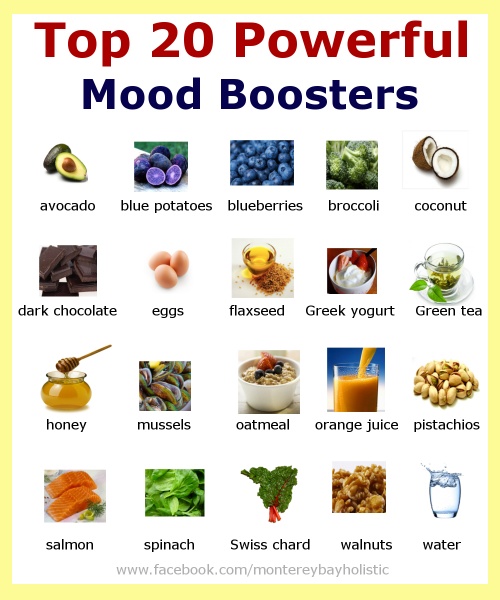
6 Tips for Foods and Beverages That Help You Feel Good
1. Seek out foods rich in vitamin B12 and folic acid (folate).
Folic acid (folate) and vitamin B12 appear to help prevent disorders of the central nervous system, mood disorders, and dementias.
- Folic acid is usually found in beans and greens.
- Vitamin B12 is found in meats, fish, poultry, and dairy.
- dishes that feature B-12 and folic acid-rich foods include:
- A burrito or enchilada made with black beans plus beef, chicken, or pork
- A spinach salad topped with crab or salmon
- An egg white or egg substitute omelet filled with sauteed spinach and reduced-fat cheese
2. Enjoy fruits and vegetables in a big way.
Fruits and vegetables are packed with key nutrients and antioxidant phytochemicals, which directly contribute to your health and health-related quality of life.
3. Eat selenium-rich foods every day.
Selenium is a mineral that acts like an antioxidant in the body. The presence of oxidative stress in the brain is associated with some cases of mild to moderate depression in the elderly population.
Try to get at least the recommended daily allowance for selenium: 55 micrograms a day for men and women.
- Whole grains are an excellent source of selenium. By eating several servings a day of whole grains such as oatmeal, whole-grain bread, and brown rice, you can easily get 70 micrograms of selenium.
- Beans and legumes
- Lean meat (lean pork or beef, skinless chicken or turkey)
- Low-fat dairy foods
- Nuts and seeds (especially Brazil nuts)
- Seafood (oysters, clams, crab, sardines, and fish)
4. Eat fish several times a week.
Omega-3s from fish seem to have positive effects on clinically defined mood swings such as postpartum depression
Good sources of omega-3 fatty acids include:
- Herring
- Rainbow trout
- Salmon
- Sardines
- Tuna
5. Get a daily dose of vitamin D.
The sun’s rays allow our bodies to synthesize and regulate vitamin D.
Four recent studies showed an association between low serum levels of vitamin D and higher incidences of four mood disorders: Premenstrual syndrome, seasonal affective disorder, nonspecified mood disorder, and major depressive disorder.
Very few foods naturally contain vitamin D. So she recommends we get vitamin D from a variety of sources: short periods of sun exposure, vitamin D supplements and foods.
Vitamin D can be found in:
- fortified foods, such as breakfast, cereals, breads, juices, and milk.
- Fatty fish such as salmon, tuna, and mackerel
- Beef liver
- Cheese
- Egg yolks
6. Treat Yourself to 1 oz of Chocolate
Dark chocolate has an effect on the levels of brain endorphins, those feel-good chemicals that our bodies produce. Not only that, but dark chocolate also seems to have a heart-healthy anti-clogging effect in our blood vessels.
How Foods and Beverages May Make You Feel Bad
Just as some foods can help you feel better, others can make you feel down. Here are ways to reduce the harmful effects of three foods that can drag you down.
1. Reduce foods high in saturated fat.
Saturated fat is well known for its role in promoting heart disease and some types of cancer. Now researchers suspect saturated fat also plays a role in depression.
2. Limit alcohol carefully.
That “feel-good” drink, alcohol, is actually a depressant. In small doses, alcohol can produce a temporary feeling of euphoria. But the truth is that alcohol is a chemical depressant to the human brain and affects all nerve cells.
Depending on the amount of alcohol consumed, people can go quickly from feeling relaxed to experiencing exaggerated emotions and impaired coordination.
3. Don’t go crazy with caffeine.
Caffeine can increase irritability a couple of ways. If the caffeine you consume later in the day disrupts your nighttime sleeping, you are likely to be cranky and exhausted until you get a good night’s rest.
Caffeine can also bring on a burst or two of energy, often ending with a spiral into fatigue.
Some people are more sensitive than others to the troublesome effects of caffeine. If you are sensitive to caffeine, decrease the amount of coffee, tea, and sodas you drink to see if this helps uplift your mood and energy level, particularly in the latter part of the day.
P.S. This article aims to raise awareness of the topic and is for reference only. Please consult the specialist if needed.
Source:
http://www.healthline.com/health/healthy-sleep/foods-that-could-boost-your-serotonin#Overview1
http://www.webmd.com/depression/features/foods-feel-better
